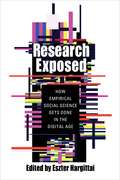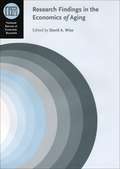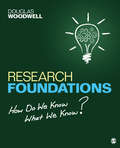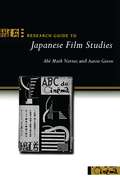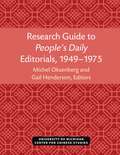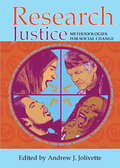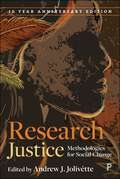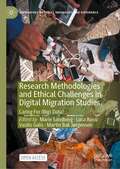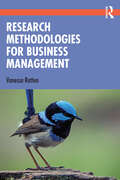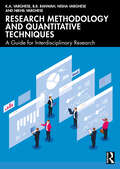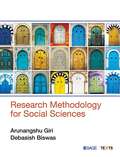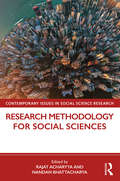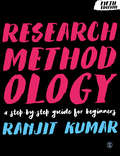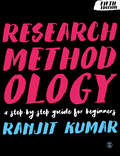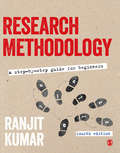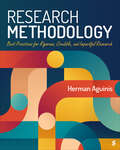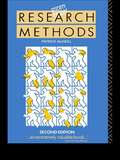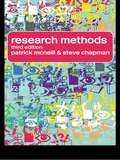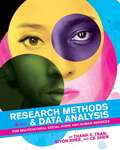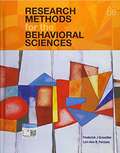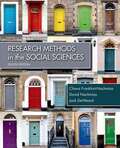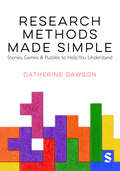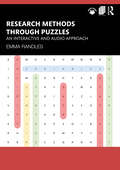- Table View
- List View
Research Exposed: How Empirical Social Science Gets Done in the Digital Age
by Eszter HargittaiThe era of digital communication provides endless opportunities for the collection and analysis of social data in novel ways. It also presents new and unanticipated challenges, as researchers are often inventing elements of their methodologies on the fly or studying a phenomenon or media platform for the first time.Research Exposed offers in-depth, behind-the-scenes accounts of doing empirical social science in this new paradigm. Through firsthand descriptions of innovative research projects, it shares lessons learned from over a dozen scholars’ cutting-edge work. These candid accounts describe what can go wrong when pioneering new genres of research and how such difficulties can be overcome, giving both big-picture reflection and actionable advice. The chapters discuss a variety of methods, ranging from the completely novel to the use of more traditional approaches in the digital context, and cover research questions relevant to a range of disciplines, including sociology, political science, communication, information studies, and anthropology.By focusing attention on the concrete details seldom discussed in final project write-ups or traditional research guides, Research Exposed helps equip junior and senior scholars alike with essential information that is all too often left with no outlet for sharing. It offers important insights into how empirical social science research can be both innovative and rigorous when dealing with the opportunities and challenges presented by digital media.
Research Findings in the Economics of Aging
by David A. WiseThe social and economic effects of this shift are significant, and in Research Findings in the Economics of Aging, a group of leading researchers takes an eclectic view of the subject. Among the broad topics discussed are work and retirement behavior, disability, and their relationship to the structure of retirement and disability policies.
Research Foundations: How Do We Know What We Know?
by Douglas R. WoodwellDesigning research can be daunting and disorienting for novices. After experiencing this first hand, author Douglas Woodwell has written Research Foundations: How Do We Know What We Know?,a book that shows how to mentally frame research in a way that is understandable and approachable while also discussing some of the more specific issues that will aid the reader in understanding the options available. Stressing the link between research and theory-building, this concise book shows students how new knowledge is discovered through the process of research. The author presents a model that ties together research processes across the various traditions and shows how different types of research interrelate. The book is sophisticated in its presentation, but uses plain language to provide an explanation of higher-level concepts in an engaging manner. Throughout the book, the author treats research methodologies as a blueprint for answering a wide range of interesting questions, rather than simply a set of tools to be applied. The book is an excellent guide for students who will be consumers of research and who need to understand how theory and research interrelate.
Research Guide to Japanese Film Studies
by Aaron Gerow Abé Markus NornesMichigan Monograph Series in Japanese Studies No. 65 The Research Guide to Japanese Film Studies provides a snapshot of all the archival and bibliographic resources available to students and scholars of Japanese cinema. Among the nations of the world, Japan has enjoyed an impressively lively print culture related to cinema. The first film books and periodicals appeared shortly after the birth of cinema, proliferating wildly in the 1910s with only the slightest pause in the dark days of World War II. The numbers of publications match the enormous scale of film production, but with the lack of support for film studies in Japan, much of it remains as uncharted territory, with few maps to negotiate the maze of material. This book is the first all-embracing guide ever published for approaching the complex archive for Japanese cinema. It lists all the libraries and film archives in the world with significant collections of film prints, still photographs, archival records, books, and periodicals. It provides a comprehensive, annotated bibliography of the core books and magazines for the field. And it supplies hints for how to find and access materials for any research project. Above and beyond that, Nornes and Gerow's Research Guide to Japanese Film Studies constitutes a comprehensive overview of the impressive dimensions and depth of the print culture surrounding Japanese film, and a guideline for future research in the field. This is an essential book for anyone seriously thinking about Japan and its cinema.
Research Guide to People’s Daily Editorials, 1949–1975
by Michel Oksenberg Gail HendersonAn indispensable aid to researching a crucial series of policy statements, the present guide provides access to the only continuous source from China which illuminates high-level policy. Includes an extensive subject index.
Research Justice: Methodologies for Social Change
by Andrew J. JolivétteResearch Justice (RJ) is a strategic framework and methodological intervention that seeks to transform structural inequities in research. Research Justice: Methodologies for Social Change builds upon the methodological frameworks developed by the national non-profit organization, DataCenter Research for Justice and is the first book to take a radical approach to socially just, community centred research. Challenging traditional models for conducting social science research within marginalized populations, it examines the relationships and intersections between research, knowledge construction, and political power/legitimacy in society. Presenting a new and highly innovative concept of Collective Ceremonial Research Responsiveness, it envisions equal political power and legitimacy for different forms of knowledge including the cultural, spiritual and experiential. The book examines how the co-existence of these various forms of knowledge can lead to greater equality in public policies and laws that rely on data and research to produce social change. Offering a much-needed analysis of the intersections between Research Methods, Public Policy, Cultural Studies, Anthropology, and Sociology, this unique book will be of wide interest to researchers and students in a variety of disciplines
Research Justice: Methodologies for Social Change
by Andrew J. JolivétteBuilding on the pioneering radical approach of Research Justice: Methodologies for Social Change—a seminal text born out of the innovative work of the DataCenter: Research for Justice—this updated edition explores the nexus of research, power, and legitimacy, advocating for equitable knowledge construction. Challenging traditional models, internationally recognized author Andrew J. Jolivétte offers a much-needed analysis of the intersections between Research Methods, Public Policy, Cultural Studies, Anthropology, Ethnic Studies, and Sociology. Complete with a new introductory chapter, the book champions diverse forms of knowledge, envisioning a future where cultural, spiritual, and experiential insights have equal impact on policy making. Interdisciplinary and thought-provoking, this is a vital resource for scholars and students alike.
Research Methodologies and Ethical Challenges in Digital Migration Studies: Caring For (Big) Data? (Approaches to Social Inequality and Difference)
by Luca Rossi Martin Bak Jørgensen Marie Sandberg Vasilis GalisThis Open Access book investigates the methodological and ethical dilemmas involved when working with digital technologies and large-scale datasets in relation to ethnographic studies of digital migration practices and trajectories. Digital technologies reshape not only every phase of the migration process itself (by providing new ways to access, to share and preserve relevant information) but also the activities of other actors, from solidarity networks to border control agencies. In doing so, digital technologies create a whole new set of ethical and methodological challenges for migration studies: from data access to data interpretation, privacy protection, and research ethics more generally. Of specific concern are the aspects of digital migration researchers accessing digital platforms used by migrants, who are subject to precarious and insecure life circumstances, lack recognised papers and are in danger of being rejected and deported. Thus, the authors call for new modes of caring for (big) data when researching migrants’ digital practices in the configuration of migration and borders. Besides taking proper care of research participants’ privacy, autonomy, and security, this also spans carefully establishing analytically sustainable environments for the respective data sets. In doing so, the book argues that it is essential to carefully reflect on researchers’ own positioning as being part of the challenge they seek to address.
Research Methodologies for Business Management
by Vanessa RattenMost existing research methodologies texts take a more general approach or are edited books of previously published articles or chapters written by different authors. This book, written by a business management scholar, covers the fundamentals of business management research and its methodologies in a seamless, unified manner. The book offers up-date methodologies and accessible explanations of the research process. It starts with advances in business management research methodology and gives a thorough overview on the different levels of analysis in the field. It builds upon the knowledge by examining both qualitative and quantitative research methodologies in the context of business management. It also goes over the use of machine learning and other technological advances like AI in research and data collection, as well as how the United Nations sustainable development goals are being considered by researchers. This book will help business management students and junior researchers quickly build an essential base of knowledge and gain a strategic advantage in publishing and reviewing business related research.
Research Methodology and Quantitative Techniques: A Guide for Interdisciplinary Research
by K.A. Varghese B.R. Ranwah Nisha Varghese Nikhil VargheseResearch Methodology and Quantitative Techniques is a guide tailored for students and research scholars navigating the intricate landscape of research degrees across various disciplines.From clearing coursework to formulating research synopses, selecting methodologies, conducting analysis and penning impactful theses, this book is a roadmap for every stage of the research journey. It empowers scholars to undertake original, quality research that not only fulfills academic requirements but also contributes to the burgeoning pool of knowledge in diverse fields. Uniquely structured to address the specific needs of researchers, this guide goes beyond traditional boundaries, delving into areas like IPRs and research ethics often overlooked in discipline-oriented texts. By offering comprehensive support, from topic selection to publication, it aims to be the go-to resource for researchers seeking a seamless path from inception to dissemination.This book, Research Methodology and Quantitative Techniques, addresses every facet of research with clarity and insight and serves as both a companion and a vital tool for scholars poised to make a meaningful research impact in their fields.
Research Methodology for Social Sciences
by Debasish Biswas Arunangshu GiriAn indispensable companion to UG and PG students of social sciences, this book will enable readers to identify research problems, carry out research enquiries effectively and report them systematically for further use. The unique feature of this book is that it indicates the absence of a common research methodology and introduces a family of approaches that can be applied to varied research situations. Through numerous examples and extensive referencing to popular statistical software packages such as SPSS and AMOS, the book will help students of social sciences to develop the fundamentals of data collection and analysis, and a thorough understanding of the research process as a whole. Providing a wide array of research techniques, Research Methodology for Social Sciences is an invaluable resource for all young researchers. Key Features: Adopts a simplified yet comprehensive approach to all major steps in the application of research methods in social sciences Emphasizes on SPSS and AMOS, and their uses through different numerical examples. Demonstrates the application of each research method step-by-step and suggests ways to minimize computational hassles Includes examples from various social science fields including anthropology, history and political science and so on.
Research Methodology for Social Sciences (Contemporary Issues in Social Science Research)
by Rajat Acharyya Nandan BhattacharyaResearch Methodology for Social Sciences provides guidelines for designing and conducting evidence-based research in social sciences and interdisciplinary studies using both qualitative and quantitative data. Blending the particularity of different sub-disciplines and interdisciplinary nature of social sciences, this volume: Provides insights on epistemological issues and deliberates on debates over qualitative research methods; Covers different aspects of qualitative research techniques and evidence-based research techniques, including survey design, choice of sample, construction of indices, statistical inferences and data analysis; Discusses concepts, techniques and tools at different stages of research, beginning with the design of field surveys to collect raw data and then analyse it using statistical and econometric methods. With illustrations, examples and a reader-friendly approach, this volume will serve as a key reference material for compulsory research methodology courses at doctoral levels across different disciplines, such as economics, sociology, women’s studies, education, anthropology, political science, international relations, philosophy, history and business management. This volume will also be indispensable for postgraduate courses dealing with quantitative techniques and data analysis.
Research Methodology: A Step-by-Step Guide for Beginners
by Ranjit KumarDesigned with students, for students Eight steps, two pathways, one book. The Fifth Edition of the bestseller Research Methodology has reimagined, redesigned, and fully renovated how a textbook can help students achieve success in their methods course or research project. Eight steps: Foolproof for any beginner researcher, the book breaks the process of designing and doing a research project into achievable stages. It delivers students from research problem to their written research report at the pace they need, with clear explanations, DIY tasks, helpful visualizations and study skills support. Two pathways: With an innovative, beautiful design, regular progress checkpoints have been built into the book and its online resources. As students proceed through the 8 steps, each chapter provides regular opportunities for students to check understanding or give themselves a challenge. Each pathway then gives them the resources they need. Confused? Stop, practise with quizzes and flashcards, or use a video to look at a concept a different way. Up for a challenge? Access a wealth of additional material including research articles, readings, case studies, activities, bibliography tools and inspiration to pursue your curiosity, impress your lecturer, and nail your assignments. With this one book, every student gets what they need to succeed. It is the perfect essential text for students and beginner researchers across the social sciences.
Research Methodology: A Step-by-Step Guide for Beginners
by Ranjit KumarDesigned with students, for students Eight steps, two pathways, one book. The Fifth Edition of the bestseller Research Methodology has reimagined, redesigned, and fully renovated how a textbook can help students achieve success in their methods course or research project. Eight steps: Foolproof for any beginner researcher, the book breaks the process of designing and doing a research project into achievable stages. It delivers students from research problem to their written research report at the pace they need, with clear explanations, DIY tasks and study skills support. In a new landscape format it presents figures, models and visualizations elegantly, so they don′t break over a page, making even complex concepts easier to understand. Two pathways: With an innovative, beautiful design, regular progress checkpoints have been built into the book and its online resources. As students proceed through the 8 steps, each chapter provides regular opportunities for students to check understanding or give themselves a challenge. Each pathway then gives them the resources they need. Confused? Stop, practise with quizzes and flashcards, or use a video to look at a concept a different way. Up for a challenge? Access a wealth of additional material including research articles, readings, case studies, activities, bibliography tools and inspiration to pursue your curiosity, impress your lecturer, and nail your assignments. With this one book, every student gets what they need to succeed. It is the perfect essential text for students and beginner researchers across the social sciences.
Research Methodology: A Step-by-Step Guide for Beginners (Social Research Methods Ser.)
by Ranjit KumarAs with the first the Second Edition of Research Methodology is designed specifically for students with no previous experience or knowledge of research and research methodology. The practical step-by-step approach provides students with strong content and a conceptual framework. Discussions relating to concepts and theory range from simple to complex in their approach. This clear and concise text links theory with eight practical steps central to any research process. It focuses on developing research skills by providing practical examples from both qualitative and quantitative research for a balanced and comprehensive grounding in research methodology. Some of the major research areas covered by the book are: - types of research - formulating a research problem - reviewing literature - research and study designs - methods of data collection - types of validity - the concept of sampling - analysis of data - writing a research proposal - ethical considerations concerning research participants - writing a research report - research methodology and practice evaluation
Research Methodology: Best Practices for Rigorous, Credible, and Impactful Research
by Herman AguinisResearch Methodology: Best Practices for Rigorous, Credible, and Impactful Research takes a 360-degree view of understanding and doing research, helping readers become expert researchers, reviewers, and consumers of research. Renowned author, journal editor, and researcher Herman Aguinis distills the vast body of work on methodological best practices into a singular experience. Each of the 16 chapters thoroughly explains a different aspect of methodology step by step, from choosing useful and compelling research topics to reporting results accurately and credibly. Researchers at all career stages will find this text helpful to structure and conduct high-impact empirical research aimed at producing a thesis, dissertation, or journal publication. Research consumers will find instruction on how to evaluate the rigor and credibility of research conducted by others. Instructors will find the book’s modular approach refreshing by assigning students the most relevant topics—from checklists of best practices to an in-depth treatment of a methodology. Filled with "how-to’s" and "dos and don’ts", figures, hands-on exercises, and "Methods in Practice" boxes that summarize and apply best practices, this book is a must-have for anyone interested in producing or reading research. Included with this title: LMS Cartridge: Import this title’s instructor resources into your school’s learning management system (LMS) and save time. Don’t use an LMS? You can still access all of the same online resources for this title via the password-protected Instructor Resource Site. Learn more.
Research Methodology: Best Practices for Rigorous, Credible, and Impactful Research
by Herman AguinisResearch Methodology: Best Practices for Rigorous, Credible, and Impactful Research takes a 360-degree view of understanding and doing research, helping readers become expert researchers, reviewers, and consumers of research. Renowned author, journal editor, and researcher Herman Aguinis distills the vast body of work on methodological best practices into a singular experience. Each of the 16 chapters thoroughly explains a different aspect of methodology step by step, from choosing useful and compelling research topics to reporting results accurately and credibly. Researchers at all career stages will find this text helpful to structure and conduct high-impact empirical research aimed at producing a thesis, dissertation, or journal publication. Research consumers will find instruction on how to evaluate the rigor and credibility of research conducted by others. Instructors will find the book’s modular approach refreshing by assigning students the most relevant topics—from checklists of best practices to an in-depth treatment of a methodology. Filled with "how-to’s" and "dos and don’ts", figures, hands-on exercises, and "Methods in Practice" boxes that summarize and apply best practices, this book is a must-have for anyone interested in producing or reading research. Included with this title: LMS Cartridge: Import this title’s instructor resources into your school’s learning management system (LMS) and save time. Don’t use an LMS? You can still access all of the same online resources for this title via the password-protected Instructor Resource Site. Learn more.
Research Methods
by Patrick McNeillThis is the second, fully revised and updated edition of a highly praised text introducing sociological research methods to the student. It is written for the non-specialist, yet introduces all the central issues of social research.
Research Methods
by Steve Chapman Patrick McNeill Patrick McneillSince its first edition in 1985, Patrick McNeill's Research Methods has become a classic introductory text for students of sociology at A level and in undergraduate courses as well as for a range of specialists in education, business, social care and medicine who need a brief but authoritative account of how sociologists set about conducting research. After a brief overview of the history of sociological research which introduces key concepts, this new edition, co-authored with Steve Chapman, describes the main sociological research methods, and includes sections on theory, science and values as well as: references to research studies developments in relevant sociological theory developments in research methodology new material on the presentation of research findings. Including an appendix of questions which students should ask when they are evaluating accounts of research, this lasting text retains the clarity of style of the second edition, and brings the content up-to-date.
Research Methods & Data Analysis for Multicultural Social Work and Human Services
by Thanh V Tran Siyon Y Rhee Ce ShenResearch Methods & Data Analysis for Multicultural Social Work and Human Services introduces research methodology to social work students and practitioners. It provides hands-on examples of how to conduct data analysis in SPSS and Stata. It equips readers with the skills needed to become critical research consumers and to engage in agency-based research and evaluation. The text teaches students how to collect appropriate data and analyze data that is suitable for each type of research design. It prepares them to conduct applied social science research in a variety of fields, such as health and mental health, ethnic studies, acculturation, family violence, LGBT studies, and more. Topics addressed include the process of research, ethical issues, the validity and reliability of research instruments, design types, and relevant statistical tools. Research Methods & Data Analysis for Multicultural Social Work and Human Services provides a solid foundation and knowledge base for students and researchers. It is an excellent resource for undergraduate and graduate level research methods and design classes and courses on research and statistics in social work.
Research Methods For The Behavioral Sciences
by Frederick J. Gravetter Lori-Ann B. ForzanoSee how interesting experimental and nonexperimental research can be with RESEARCH METHODS FOR THE BEHAVIORAL SCIENCES, 6th Edition. Inviting and conversational, the text leads you through the research process from start to finish -- using a step-by-step approach that emphasizes the decisions researchers make at each stage. Current research examples are selected to be of particular interest to students like you, and learning objectives help you focus on what's important. Chapter after chapter, the authors' "lecture in a book" style delivers clear explanations of topics that make this text easy to read and understand.
Research Methods In The Social Sciences
by Chava Frankfort-Nachmias David Nachmias Jack DeWaardUsing real-world examples, Research Methods in the Social Sciences illustrates the relevance of social sciences research in today's world.
Research Methods Made Simple: Stories, Games & Puzzles to Help You Understand
by Catherine DawsonPractical. Interactive. Engaging. This book provides an imaginative alternative to doing research methods. With visual prompts and easy-to-follow activities, it will help you understand the basic foundations of the research process in bite-sized pieces that suit your way of learning. Including activities such as word searches, crosswords, spider charts and puzzles, this book will help you gain a wider understanding of how, and why, specific research methods are used. Complete with a variety of learning features, this book will: Build your understanding of the core principles of research. Help you to interpret different methods and their practicalities. Aid you in identifying your weakness and adapting useful techniques to combat these. Stand as a visual toolkit that sets content out in bite-sized pieces. Perfect for beginners, this user-friendly guide will give you a deeper understanding of research methods through action, images, and visualization.
Research Methods Made Simple: Stories, Games & Puzzles to Help You Understand
by Catherine DawsonPractical. Interactive. Engaging. This book provides an imaginative alternative to doing research methods. With visual prompts and easy-to-follow activities, it will help you understand the basic foundations of the research process in bite-sized pieces that suit your way of learning. Including activities such as word searches, crosswords, spider charts and puzzles, this book will help you gain a wider understanding of how, and why, specific research methods are used. Complete with a variety of learning features, this book will: Build your understanding of the core principles of research. Help you to interpret different methods and their practicalities. Aid you in identifying your weakness and adapting useful techniques to combat these. Stand as a visual toolkit that sets content out in bite-sized pieces. Perfect for beginners, this user-friendly guide will give you a deeper understanding of research methods through action, images, and visualization.
Research Methods Through Puzzles: An Interactive and Audio Approach
by Emma RandlesDive into the world of research with this interactive puzzle book. Whether you're just starting out with research methods or looking to refresh your knowledge on the basics, this book offers a fun and engaging way to get to grips with everything research related. You'll explore key topics like variables, sampling methods, experimental design, reliability, and validity—plus so much more!With clear, easy-to-follow explanations, you’ll learn how to control variables, understand different types of data, develop hypotheses, ensure reliability and validity, and choose the right statistical tests. Each concept is paired with puzzles to help you consolidate what you’ve learned. And to make it even easier, each chapter has support material in the form of a helpful audio guide to walk you through the material.This book takes a conversational approach to make learning research methods feel less intimidating, and more enjoyable! Whether you're a student or just someone interested in research, this puzzle book turns learning research methods into an engaging and fun activity.
